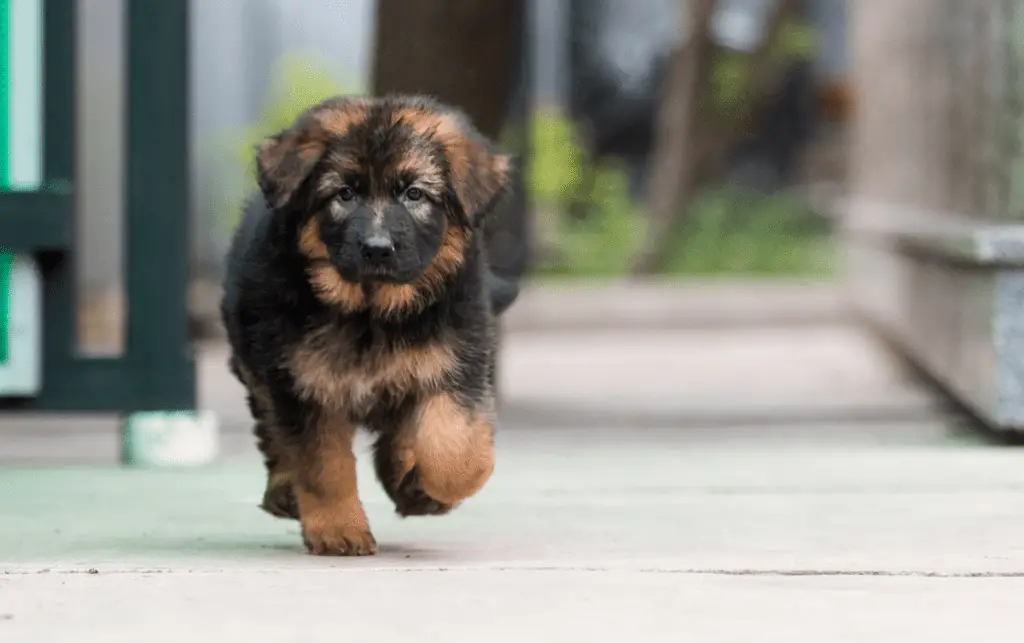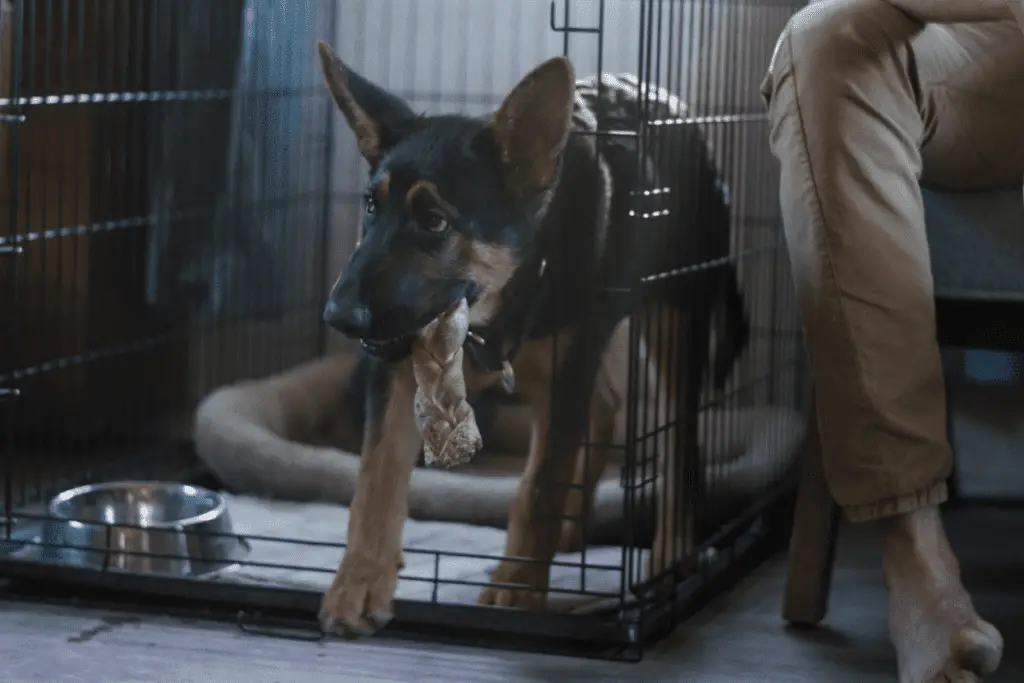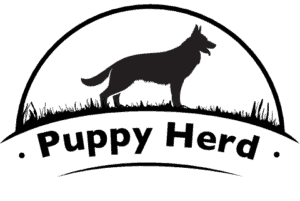Potty training can seem like a daunting task for any new dog owner, but it doesn’t always have to be. While some dog breeds may pick it up quicker than others, knowing how to handle potty training properly will do wonders for your dog. That brings us to our question: are German Shepherds easy to potty train?
German Shepherds are known to be a relatively easy breed to potty train, as they’re very intelligent. Start potty training your German Shepherd around 8-16 weeks until it gains control of its bladder around 5-6 months. Positive reinforcement and learning the signs that your pup has to go can prevent accidents.
The rest of this article will discuss the best time to begin potty training, the different ways you can introduce your puppy to potty training, how to positively reinforce a puppy’s good behavior, and signs that may indicate your puppy is about to go.

When Should I Begin Potty Training My German Shepherd?
German Shepherds should begin potty training very early. Around 8 to 16 weeks old is the best time to start training your puppy, or whenever you first bring your puppy home. It’s essential to remember not to be too strict on your puppy right away, and always use positive reinforcement.
When you first begin potty training your German Shepherd, keep in mind that your puppy can’t fully control its bladder until it’s 5-6 months old. So, while you may be starting to potty train your puppy from a very young age, what you’re doing is developing a schedule for your puppy to adapt to eventually.
How Should I Potty Train My German Shepherd?
If you want to see the best results and the most benefits from potty training, you’re going to want to know how to do it correctly. There are many different ways to begin potty training, and how well each method works will depend on your German Shepherd.
Create A Schedule (Every 2-3 Hours)
It’s crucial to create a potty schedule for your German Shepherd puppy and stick to it. As mentioned, puppies can’t fully control their bladder until they’re five months old. Therefore, taking them outside many times a day at the same time will create a schedule and hopefully prevent accidents in the house.
You can begin taking your puppy out every 2-3 hours, especially if it’s still very young. While this might not prevent every accident, it’ll get your puppy into a routine and possibly save you from some cleanup.
The American Kennel Club follows the guide that dogs can hold their bladders for the number of hours corresponding to their age in months, up to nine months. So, if you have a five-month-old puppy, five hours will probably be the maximum amount of time it can hold its bladder.
While this is a decent guide to follow, you should also let your German Shepherd out throughout the day—especially first thing in the morning and right before going to bed.
Other times to let your dog outside include:
- Soon after eating
- 10-20 minutes after drinking water
- After playtime
- After being in a crate
Removing the water bowl from your puppy at least an hour before bed may also help prevent accidents overnight.

Start Crate Training
Crate training is a popular way many people potty train their German Shepherds. Not many dog lovers enjoy the sight of their puppy confined in a crate; however, it has been proven to be effective and will most likely result in fewer accidents in the house.
It might not be easy at first to get your puppy used to its crate, but once dogs adapt to it, they’ll think of their crate as their own little space.
Using a crate usually works as a potty training tool because dogs don’t usually like to use the bathroom in their living spaces. Therefore, they’ll try as much as possible to hold their bladder while inside the crate.
However, the crate must be the correct size. You don’t want it to be too small, but if it’s too big, your puppy might think it’s okay to use a corner as its bathroom space.
Eventually, your puppy should whine or scratch when it needs to go potty, and you can use this as your cue to let it outside. But make sure to do so quickly!
While this is an excellent method, it might not work for every dog. See what works best for your German Shepherd and your overall situation before deciding to train it this way.
Leave Puppy Pads Out
Puppy pads are another excellent potty training tool. This method, however, might prove to be a little more complicated than putting your dog in a crate. Puppies won’t automatically go to these pads to potty, so training is needed.
Train your German Shepherd to use puppy pads the same way you train it to go outside and potty. Take your dog over to the pads several times during the day and ask it to go potty. If there’s an accident in the house, calmly take your dog to the puppy pad and use the potty command again. Eventually, your puppy should catch on.
Puppy pads are a good option if you work all day and want to leave something for your puppy to potty on while you’re gone. However, giving several potty areas can sometimes confuse your puppy and may not work the best for it.
If you’re looking for excellent puppy pads, the All-Absorb A01 Training Pads on Amazon are highly recommended. These pads are quick-drying so that nothing will leak through onto your flooring, and have a built-in attractant and an odor neutralizer. A single pad can hold up to three cups of liquid.
Signs Your German Shepherd Needs To Go Potty
If you’re struggling with potty training, there are specific signs to look out for that might indicate your German Shepherd needs to go.
While every dog is different, most of the time, these signs point to potty time:
- Your puppy is sniffing in circles. If you notice your German Shepherd circling while sniffing, it might be looking for a nice place to go!
- Your puppy suddenly stops playing. If your puppy suddenly stops playing and begins to wander off, it’s probably looking for somewhere to go. Anytime you notice a sudden change of pace, you should immediately take your puppy out to go potty.
- Your puppy is digging and sniffing the floor. Sniffing is a good indicator your puppy needs to find a place to go. Digging or searching for an area is another prominent sign.
The Importance Of Positive Reinforcement
Consistency is vital when it comes to potty training, especially with German Shepherds. German Shepherds are self-assured dogs, so without consistent positive reinforcements, they won’t learn as well.
Puppies are fragile, and while it’s important to assert dominance over your dogs to a degree when it’s learning the basics such as potty training, gentle teaching is the best course of action. Yelling at your puppy for going potty in the house is only going to make them go when you’re not looking, and it’s not a suitable teaching method.
Providing words of encouragement and treats will give your dog the confidence it needs to learn the potty training skill quickly and effectively.
Final Thoughts
While potty training dogs doesn’t happen overnight, German Shepherds are known to be one of the easier breeds to train. Because of their confidence and intelligence, they pick up training quickly and relatively effortlessly.
Choosing the potty training method that works best for you and your German Shepherd should make the process painless. Looking out for the warning signs that your dog is about to go, giving positive reinforcement when it does, and being consistent in training will work wonders.
